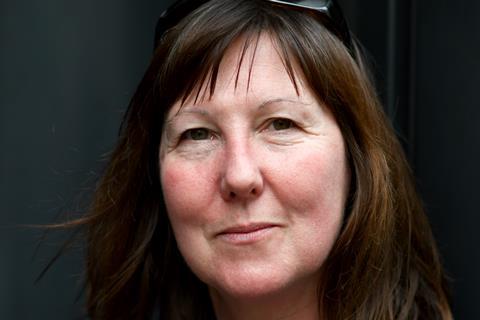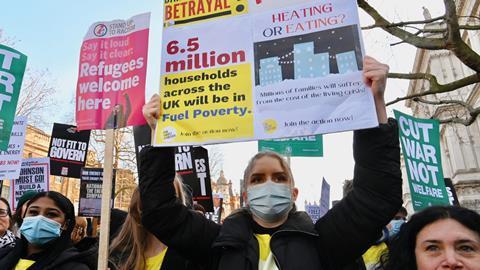In our second feature on poverty and the law, Marialuisa Taddia reports on the frontline solicitors helping the vulnerable navigate a bewildering and woefully inadequate benefits system
The low down
Since 2010, austerity has disproportionately affected women, children, people with disabilities and EU nationals through changes in the laws affecting welfare benefits. Proving and contesting eligibility has become increasingly complex, meaning law centres are seeing desperate clients from further afield. From 2013 the LASPO civil legal aid cuts helped create advice ‘deserts’ in large parts of England and Wales. Yet there is a chance of reform. The Ministry of Justice is conducting a consultation on the Legal Aid Means Test, and is being urged to consider further changes. Lawyers advising clients on benefits argue reform is urgent – unless you can solve a person’s benefit issue, then you exacerbate their problems.
Carrie Morrison, the first woman to become a solicitor in England, spent much of her early career providing free legal assistance to the down-and-outs at Toynbee Hall in London’s East End. She was a ‘poor man’s lawyer’, a pro bono movement that sprung up in the 1890s and was the predecessor of legal aid. It was not until the 1940s, with the advent of the welfare state, that public funding for legal advice was introduced through the Legal Aid and Advice Act 1949 in England and Wales.
Fast-forward 100 years and demand for legal assistance by the poorest in society has never been higher thanks to a mix of rising prices, falling incomes and benefit cuts. Yet much of that need remains unmet.
The Office for Budget Responsibility has noted that wages are not keeping pace with rising inflation, which hit 8.2% in April. Average household energy bills rose by 54% last month, with further increases expected later this year.
Benefits are not keeping pace either, following the government’s decision in April to uprate them by just 3.1%. The Joseph Rowntree Foundation, a charity that tackles poverty in the UK, has warned that this real-terms cut in benefits will pull 600,000 people into poverty, around a quarter of whom are children. Without an increase, many will not be able to heat their homes, argues Sue James chief executive of the Legal Action Group, a national independent charity which promotes equal access to justice. ‘They will be forced to choose between heat and food,’ she says.
Austerity fallout
Sue Bent, immediate past CEO of Central England Law Centre, blames the austerity measures introduced in 2010. ‘Women, children, people with disabilities and EU nationals have been directly targeted by many of these measures,’ she says. These include changes to child benefit and transfer from legacy benefits to the ‘significantly less generous’ universal credit (UC) introduced in April 2013. This replaced six means-tested benefits and tax credits with a single monthly payment.
The personal independence payment, a benefit for disabled people also introduced in April 2013 by the Welfare Reform Act 2012, has targeted the mobility component, ‘leading many people to lose access to Motability vehicles’, Bent notes. Motability is a vehicle-leasing scheme, funded by the mobility component of individuals’ benefits payments.
Meanwhile, the allowance for carers is treated as income for UC and is directly deducted from it. ‘So you don’t tend to get any benefit for being a carer, which is obviously crazy when you think about the burden they shoulder and the money they are saving the state,’ says Siobhan Taylor-Ward, a social welfare and housing solicitor at Liverpool’s Vauxhall Law Centre.
'We see many clients struggling in work due to mental and physical ill-health – much of which is related to poverty – and a lack of disability-related reasonable adjustments'
Audrey Ludwig, Suffolk Law Centre
According to James, a number of issues overlay each other causing ‘entrenched poverty’. These include the freeze on most benefits and tax credits for the last four years; the benefit cap and the two-child limit (the latter introduced by the Welfare Reform and Work Act 2016); and the withdrawal of the weekly £20 uplift in UC last October. ‘All of this is then exacerbated by zero-hours contracts and a complicated benefit system which is incredibly difficult to navigate. In my experience single mothers are the hardest hit,’ she says.
Nimrod Ben-Cnaan, head of policy and profile at the Law Centres Network, says that while energy costs were going to increase considerably even before the Ukraine invasion, ‘the pandemic has exacerbated the problems that our clients face. On the one hand, problems such as job loss, leading to greater debt that endangers tenancies, have become much more common, while supports such as furlough payments and isolation support payments have taken time to become available.
‘On the other hand, help-seeking behaviour was significantly altered because of the forced move to remote services, which many in need have struggled to access.’
Illness – whether physical or mental – is a key part of the poverty cycle. Audrey Ludwig is director of legal services at Suffolk Law Centre, set up in 2018 to address the legal problems affecting those who cannot afford to pay for legal advice. ‘We see many clients struggling in work due to mental and physical ill-health – much of which is related to poverty – and a lack of disability-related reasonable adjustments by both employers and the DWP [Department for Work and Pensions]. We are starting to see that include people with long Covid.’
The profile of the law centre’s clients has changed in other ways: from those outside the job market to those moving in and out of it, which causes problems with retaining legal aid throughout a case. ‘It is about that multiplicity of price rises, job and housing loss, periods of sick leave on only statutory sick pay or even unpaid, the cost of juggling debt, the requirement to have internet access to retain work-related benefits and lack of available safety nets,’ says Ludwig. ‘So people turn to expensive payday loans, credit cards and loan sharks. Many have deductions for utility debts and sanctions being taken from their universal credit.
‘Being in poverty is time-consuming, relatively expensive and stressful.’
Human rights threat
The government’s plan to overhaul the Human Rights Act 1998 is another threat to the poorest in society, advocates for the vulnerable stress. A consultation on proposals to reform the legislation – to ‘restore a proper balance between the rights of individuals, personal responsibility and the wider public interest’ – closed last month.
‘The Human Rights Act plays an important role in our work of defending the most vulnerable, and it is often the last safety net for people who have been mistreated,’ says Jason Tetley, director of Greater Manchester Law Centre. ‘We would be looking to extend rights, not strip them back, and have no faith that this is what’s currently intended.’
‘The HRA can be used by everyone in the UK, regardless of their nationality or status, to hold the government and public bodies to account,’ says Emma Lough, director of Lawyers Against Poverty. ‘At a time when we’re facing the prospect of more and more regressive policies likely to lead to wide systemic exclusion, removing these basic accountability mechanisms will leave many who face rights abuses with no recourse.’
Nimrod Ben-Cnaan, head of policy and profile at the Law Centres Network, says: ‘Human rights claims are at the complex end of justiciable issues where, due to legal aid cuts, those most likely to need legal assistance already find it very difficult to access it. Government proposals for “prospective-only remedies” would make it near impossible for these people to get justice, because even if they win the argument, they would be denied the remedy. Overall, replacing HRA would further shield public bodies from accountability for regressive or discriminatory decisions that worsen poverty and inequality in the UK.’
Legal aid loss
If one side of the coin is rising poverty, the other is diminishing legal advice available to navigate the benefits maze. The Legal Aid, Sentencing and Punishment of Offenders Act (LASPO) 2012 came into force in April 2013 just when the social security system was being drastically reformed. This weakened another key pillar of the welfare state introduced after the second world war. LASPO removed legal aid from several civil law areas, narrowed financial eligibility criteria, and created ‘legal aid deserts’ in large areas of England and Wales.
‘Access to civil legal aid is vitally important for reducing poverty,’ according to James. ‘It is also a key element in addressing health inequalities.’ She argues that ‘social determinants of health’, such as education, employment, housing and diet, can be ‘mitigated’ by access to legal advice. ‘Early access to advice is essential, but currently not available,’ she points out.
Just this week, indeed, cross-party think tank the Social Market Foundation has called for civil legal aid cuts to be reversed and advisers stationed in GP surgeries and libraries to help people access justice.
'I have clients who can’t even put credit on the phone. So they are having to walk to places to see someone face to face. And those places are few and far between'
Siobhan Taylor-Ward, Vauxhall Law Centre
Taylor-Ward highlights the five-week wait for the first UC monthly payment. Claimants can get an advance on this that must be paid back in instalments. For example, a single-parent client had £66 deducted monthly to repay the advance. ‘That is an enormous amount of money when you only get £551 for your entire living costs, including housing costs, so that makes a massive difference,’ she says. ‘And people don’t understand that they can ask for that [deduction] to be lowered if they are in hardship.
‘It is only once you get to an advice centre or law centre that you find out about all the other things that might be available to help you.’ This includes help with energy bills or citizens support schemes.

Taylor-Ward argues that government and local authorities do not give enough information about what help is available and also make it hard for people with no fixed-line internet or a computer to access it.
‘I have clients who can’t even put credit on the phone,’ she says. ‘So they are having to walk to places to see someone face to face. And those places are few and far between.’
Jason Tetley, director of Greater Manchester Law Centre, says LASPO ‘absolutely devastated the legal aid sector and made access to justice much more difficult to obtain for people who fall into the “justice gap” or whose legal issues fall outside the scope of legal aid’.
The first group are people who are ineligible for legal aid but cannot afford private fees. The second are hit by ‘a vast amount’ of civil law that now falls outside scope, including almost all debt and employment cases, family law and welfare benefits law, according to Tetley.
Taylor-Ward says that means testing ‘excludes way too many people who have just got no other way of paying for legal advice other than legal aid’.
Vauxhall Law Centre does not have a legal aid contract yet, so all work is done pro bono by grant funding. Many clients seeking housing advice ‘are people who have just slightly fallen outside of the means test and of course it is a struggle because they now have to pay court fees and expert fees,’ Taylor-Ward says.
Consultation on the means test
On 15 March, the Ministry of Justice launched a three-month consultation with a view to expanding eligibility. The Legal Aid Means Test Review (MTR), first announced in February 2019, covers ‘the income and capital thresholds for civil and criminal legal aid eligibility, wider eligibility criteria, and the income and capital contributions potentially payable towards the costs of legally aided representation’.
This is widely considered too little, too late. ‘Tinkering around the edges of the system and making small adjustments will never be enough, even where the proposed changes are welcome,’ says Tetley. Instead, he would like to see ‘extensive reform, repeal of LASPO and a complete review of the legal aid system’.
Law Society president I. Stephanie Boyce tells the Gazette: ‘People living below the poverty line have been unable to qualify for legal aid in recent years, as evidenced by our research, so changes to the means test are positive because a broader section of society will qualify for legal aid.

‘However, people still cannot get legal aid for areas of law such as welfare benefits, debt and employment.’
James says: ‘Legal aid for welfare benefits cases is a pressing area for reform. Unless you can solve a person’s benefit issue, then you exacerbate their problems. The failure to resolve a benefit issue creates rent arrears and then eviction, as well as health and wellbeing problems… We need to stop treating problems in silos and start to help the whole person.’
Bent says that ‘access to justice can definitely alleviate some of the problems facing those in poverty, but it needs to be more comprehensive in terms of scope to avoid “island-hopping”, where we can assist on some issues, for example possession proceedings, but not others, such as benefit appeals, even where to the client they are clearly and closely linked’.
For instance, the very limited scope of housing legal aid following LASPO means that Central England Law Centre is unable to assist clients in rent arrears until they are sent a notice threatening eviction. This may only be received two weeks before court proceedings start. ‘We are also only very rarely able to help clients with disrepair issues, despite poor housing conditions being very common for the poorest in society and a major cause of physical and mental ill-health,’ she says.
'Unless you can solve a person’s benefit issue, then you exacerbate their problems. The failure to resolve a benefit issue creates rent arrears and then eviction, as well as health and wellbeing problems… We need to stop treating problems in silos and start to help the whole person'
Sue James, Legal Action Group
Ben-Cnaan says the proposed changes are ‘welcome and years overdue’ but ‘are not enough to meaningfully tackle poverty. Making more people eligible for legal aid is great, but who is going to meet the demand?’ Law centres, he adds, are already receiving calls for help from further and further afield because the government has neglected civil legal aid, letting the provider base dwindle.
‘We need an independent review of civil legal aid, akin to [the MoJ’s Criminal Legal Aid Review],’ Ben-Cnaan says. ‘Fees need to be updated to catch up with more than 25 years of depreciation. Contracting needs to become more flexible… And, fundamentally, legal aid needs to be reconfigured around the people it is meant to help and their needs. Not as a funding and procurement mechanism but as a coherent service, designed for accessibility and well promoted.’
The MTR proposals also mean that more people would be means-tested rather than ‘passported’ into legal aid. Ben-Cnaan says: ‘Legal aid providers will spend more time doing the non-legal, and unpaid, work of checking eligibility, and for the same insufficient fees as currently. This could easily lead to more providers quitting.’

Political choice
Ultimately, legal assistance on its own is not enough to tackle poverty. Ben-Cnaan says: ‘Letting poverty occur and persist is a political choice that successive governments continue to make.’ He points out that during the pandemic the government proved that it could end the longstanding problem of rough sleeping.
Another example is child poverty, which fell in 2021, ‘right at the point when things could have got much worse for families,’ says Hannah Aldridge, head of policy at Child Poverty Action Group. ‘At the beginning of the pandemic the government invested in social security, adding £20 per week to universal credit to protect families from the economic impacts of multiple lockdowns. Modelling shows that this caused child poverty to fall, but that reduction was lost when the £20 was later cut.
‘The pandemic has shown that the most effective way for government to reduce child poverty is to invest in social security. To keep child poverty falling, investment needs to be concerted, strategic and long-term, and accompanied by improved services for families such as extended school days, universal free school meals and affordable childcare. And for all this to happen in a sustained way, we need a legal framework that makes each successive government accountable for reducing child poverty.’
The Child Poverty Act 2010 imposed a legal duty on governments to produce a child poverty strategy and to make progress on four targets covering relative poverty, absolute poverty, material deprivation and persistent poverty, according to Aldridge. ‘But, with the Welfare Reform and Work Act 2016, those targets were lost and child poverty has risen sharply.’

No single solution
‘There is no single solution and I cannot see any single statutory step that will make a difference,’ says Ludwig. But she highlights several areas for action such as: tracking the relative inflation affecting the recipients of social benefits and a return of the ‘social fund’; increasing the local housing allowance to reflect actual rents; bringing debt and welfare benefits back into
scope for legal help and legal aid regulations to allow people’s incomes to fluctuate ‘without excessive penalisation and loss of their enforceable legal rights’; and a ‘polluter pays’ system where the government bodies which attract the most successful appeals against their decisions fund the legal costs of those challenges. ‘This would incentivise a “right first time” principle,’ she says.
Taylor-Ward would like to see the removal of the benefit cap, the two-child limit and the ‘no recourse to public funds’ (NRPF). NRPF applies to people ‘subject to immigration control’ such as leave to enter as a visitor or leave to remain as a spouse or as a student. This restricts access to welfare benefits for almost 1.4m people, including 175,000 children, according to Citizens Advice. ‘We see a hell of a lot of poverty and homelessness and destitution because of [NRPF]’ says Taylor-Ward. ‘If you have to leave your relationship because of domestic violence or become unfit to work, you have no access to public funds while you are in that situation.’
It is almost back to square one. ‘The pandemic and its economic aftershocks require an ambitious “Beveridge moment” akin to that which shaped the post-war welfare state,’ says Ben-Cnaan. ‘To not act decisively on these challenges would be to let down over 14 million adults and children living in poverty, now and for years to come.’
Marialuisa Taddia is a freelance journalist
































1 Reader's comment